|
Dusty Dog Reviews The whole project is hip, anti-academic, the poetry of reluctant grown-ups, picking noses in church. An enjoyable romp! Though also serious. |
|
Nick DiSpoldo, Small Press Review (on Children, Churches and Daddies, April 1997) Children, Churches and Daddies is eclectic, alive and is as contemporary as tomorrow’s news. |



|
Kenneth DiMaggio (on cc&d, April 2011) CC&D continues to have an edge with intelligence. It seems like a lot of poetry and small press publications are getting more conservative or just playing it too academically safe. Once in awhile I come across a self-advertized journal on the edge, but the problem is that some of the work just tries to shock you for the hell of it, and only ends up embarrassing you the reader. CC&D has a nice balance; [the] publication takes risks, but can thankfully take them without the juvenile attempt to shock. |
Volume 223, Auguat 2011
Children, Churches and Daddies (cc&d)
The Unreligious, Non-Family-Oriented Literary and Art Magazine
Internet ISSN 1555-1555, print ISSN 1068-5154

Cover art by John Yotko
see what’s in this issue...
Note that in the print edition of cc&d magazine, all artwork within the pages of the book appear in black and white. Also, the Roger N. Taber blog at the beginning of this Internet issue does not appear in the print issue (this Roger N. Taber writing was written and released after the print issue was released). Because of the copy’s timeliness, cc&d is includiung this writing in this immediate Internet issue. |
|
Order this issue from our printer as a a digest-sized paperback book (5.5" x 8.5") perfect-bound w/ b&w pages You can also get this from our printer as a a ISBN# paperback book (6" x 9") perfect-bound w/ b&w pages |
Internet Issue Addition

from a Roger N Taber blog about the London riots
201108910
Roger N. Taber |

poetry
the passionate stuff
Back to poor Jesoo!Fritz Hamilton
Back to poor Jesoo!
let’s not get too huffy/ if
blues singer sweating down his
he’s got his mojo workin’ &
if they did, nobody recorded it unless !
|
My front tooth falls out of my noseFritz Hamilton
My front tooth falls out of my nose, &
the world a better place/ it
Shiites murder 500 Sunnis today, &
Netanyahoo builds more housing in
the children of Chicago keep shooting screaming! SCREAMING!
screaming ... (as !
|
Internet Issue Bonus poem
Fritz Hamilton |
Internet Issue Bonus poem
Fritz Hamilton |
Crowd of NothingnessJe’free
Fabrics wrap the bodies.
Hearts pound that they may live,
More new infants are born.
|
There’s always somethingI.B. Rad
I’ve learned
|
| Janet Kuypers readin the I.B. Rad poem There’s Always Something from the 08/11 issue (v223) of cc&d magazine |

Watch this YouTube video read from the 08/11 issue (v223) of cc&d magazine, live 08/09/11, at the Café poetry open mic in Chicago |

a Perfect Marriage, art by Rose E. Grier
Neighbor BoysAndy Roberts
The neighbor boys are up on the roof again,
|
| Janet Kuypers readin the Andy Roberts poem Neighbor Boys from the 08/11 issue (v223) of cc&d magazine |

Watch this YouTube video read from the 08/11 issue (v223) of cc&d magazine, live 08/09/11, at the Café poetry open mic in Chicago |
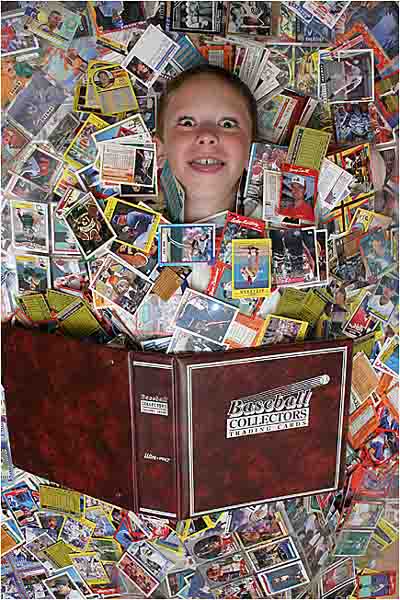
Trading Cards, art by Nick Brazinsky
At The GateLawrence Gladeview
to
no matter
it reminds me
i wonder
|
| Janet Kuypers readin the Lawrence Gladeview poem At The Gate from the 08/11 issue (v223) of cc&d magazine |

Watch this YouTube video read from the 08/11 issue (v223) of cc&d magazine, live 08/09/11, at the Café poetry open mic in Chicago |
Lawrence Gladeview BioIn 1983, Lawrence Gladeview was born to two proud and semi-doting parents. After two middle schools and losing his faith in catholic high school, he graduated from James Madison University, majoring in English and having spent only one night in jail. He is a Boulder, Colorado poet cohabiting with his fiance Rebecca Barkley. Lawrence is one of two editors for MediaVirus Magazine, and more than sixty of his poems have been featured, or are forthcoming in various print and online publications. You can read more of his poetry on his website, Righteous Rightings.
|
Garage SaleRoger Cowin
Selling the debris of my past;
|
December, 2010Stephanie Kaylor
This is the month you would have
if I hadn’t thought my freedom
but I went to the clinic that
It was not a child that left my
The roses bloomed all around me
and I knew as he left me
But Isobel, you came out strong,
|
WaveformKelley Jean White MD
So many things I cannot name:
I figure it is about a mile
If another one falls
I think I see a boat Father, I miss you
|

| Janet Kuypers readin the Kelley Jean White MD poem Waveform from the 08/11 issue (v223) of cc&d magazine |

Watch this YouTube video read from the 08/11 issue (v223) of cc&d magazine, live 08/09/11, at the Café poetry open mic in Chicago |
Head-on Collision, early eveningNathan Riggs
The cops didn’t see the indigenous mutiny
(At that moment, I remembered my Dad,
In my defense, I was sick. Voodoo Sick.
(Dad says the end is near
Oh, my dear heartless priest—
I’ve been extorted, accused,
|
Mad, Genius, Sun-RaChristopher Barnes
Ra, the black jazz sun
followers tribe into a band
fat the acid bursts the mind
|
Christopher Barnes Bioin 1998, Christopher Barnes won a Northern Arts writers award. In July 2000, Christopher Barnes read at Waterstones bookshop to promote the anthology ‘Titles Are Bitches’. Christmas 2001, Barnes debuted at Newcastle’s famous Morden Tower doing a reading of his poems. Each year Barnes read for Proudwords lesbain and gay writing festival, and he partakes in workshops. 2005 saw the publication of his collection LOVEBITES published by Chanticleer Press, 6/1 Jamaica Mews, Edinburgh. On Saturday 16th Aughst 2003 Christopher Barnes read at the Edinburgh Festival as a Per Verse poet at LGBT Centre, Broughton St. Christopher Barnes also has a BBC webpage: www.bbc.co.uk/tyne/gay.2004/05/section_28.shtml and http://www.bbc.co.uk/tyne/videonation/stories/gay_history.shtml (if first site does not work click on SECTION 28 on second site. Christmas 2001 The Northern Cultural Skills Partnership sponsored Christopher Barnes to be mentored by Andy Croft in conjunction with New Writing North. Christopher Barnes made a radio programme for Web FM community radio about his writing group. October-November 2005, Barnes entered a poem/visual image into the art exhibition The Art Cafe Project, his piece Post-Mark was shown in Betty’s Newcastle. This event was sponsored by Pride On The Tyne. Barnes made a digital film with artists Kate Sweeney and Julie Ballands at a film making workshop called Out Of The Picture which was shown at the festival party for Proudwords. The film is going into an archive at The Discovery Museum in Newcastle and contains his poem The Old Heave-Ho. Christopher Barnes worked on a collaborative art and literature project called How Gay Are Your Genes, facilitated by Lisa Mathews (poet) which exhibited at The Hatton Gallery, Newcastle University before touring the country and it is expected to go abroad, funded by The Policy, Ethics and Life Sciences Research Institute, Bioscience Centre at Newcastle’s Centre for Life. Christopher Barnes was involved in the Five Arts Cities poetry postcard event which exhibited at The Seven Stories children’s literature building. In May 2006 Barnes had a solo art/poetry exhibition at The People’s Theatre (http://ptag.org.uk/whats_on/gulbenkian/gulbenkian.htm). The South Bank Centre in London recorded Christopher Barnes’ poem “The Holiday I Never Had”, Barnes can be heard reading it on www.poetrymagazines.org.uk/magazine/record.asp?id=18456. REVIEWS: Christopher Barnes has written poetry reviews for Poetry Scotland and Jacket Magazine and in August 2007 Barnes made a film called ‘A Blank Screen, 60 seconds, 1 shot’ for Queerbeats Festival at The Star&Shadow Cinema Newcastle, reviewing a poem...see www.myspace.com/queerbeatsfestival.
|

art by Peter LaBerge
(who also has artwork at flickr)
Adventures in Municipal GovernmentMichael CeraoloVI
In an interview a councilperson praised
|
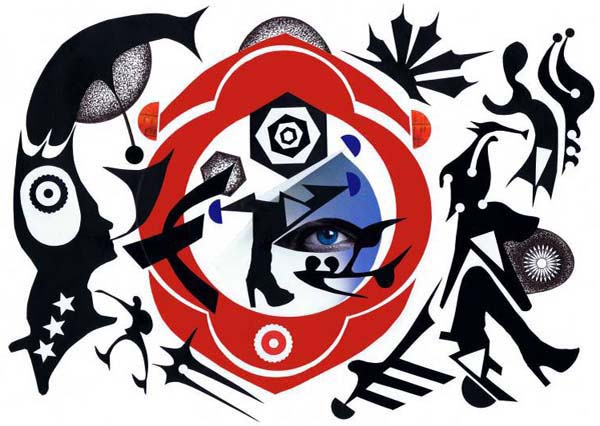
CCI30102010_00002KK, art by Üzeyir Lokman ÇAYCI
After All the Rain,
Kenneth DiMaggio |
I’m RetardedChris Butler
I’m retarded, so tell me I’m special and I’ll oblige your mind.
|
| Janet Kuypers readin the Chris Butler poem I’m Retarded from the 08/11 issue (v223) of cc&d magazine |

Watch this YouTube video read from the 08/11 issue (v223) of cc&d magazine, live 08/09/11, at the Café poetry open mic in Chicago |

estertjie, art by the HA!man of South Africa
The Sinking Ship Dilemma.Matthew Roberts
The ship is sinking and I
That is, I can only take one of
|

Aim CarefullyJanet Kuypers09/01/09
as the bullets flew through the air
when you think about it
and when it sounds like then none that’s when it’s safe to move #
I’ve been through this too many times
after so may years
tick and all this time my only thought
every time aim carefully
|
| Janet Kuypers readin her poem Aim Carefully from the 08/11 issue (v223) of cc&d magazine |
| Rather read it? Then read the original writing |

Watch this YouTube video read from the 08/11 issue (v223) of cc&d magazine, live 08/09/11, at the Café open mic she hosts in Chicago |
Frozen TogetherJanet Kuypers12/21/09
so i’m sitting at the corner stool
because when you came in,
like bright sunlight just after dawn
like bright sunlight seeping its way
it’s gone
|
| John Yotko readin the Janet Kuypers poem Frozen Together from the 08/11 issue (v223) of cc&d magazine |
| Rather read it? Then read the original writing |

Watch this YouTube video read from the 08/11 issue (v223) of cc&d magazine, live 08/09/11, at the Café weekly open mic in Chicago |

prose
the meat and potatoes stuff
the ExhibitAnne Turner Taub
Melissa Frey belonged to a group which exhibited sculpture at different “alternative locations.” “Alternative locations” meant lobbies of banks and office buildings where the group would not have to pay rent to exhibit. It was a day before the show and Melissa had to get her two pieces and pedestals ready for the show. She had to paint the pedestals and polish up her stone pieces and she hated doing it. Besides she didn’t know where the show was going to be. They had sent her a notice when to bring her pieces, when to take them down, and when the opening reception would be. But like most pieces of paper in her life, it had somehow gotten lost and she had to figure out where the show would be held. This exhibit was to be in the lobby of a law school but which law school, which building of the law school, and where it was located was something she did not know and did not really care about. For some reason exhibiting her work now seemed very important to her and she began to work hard at making the pieces look really good.
|
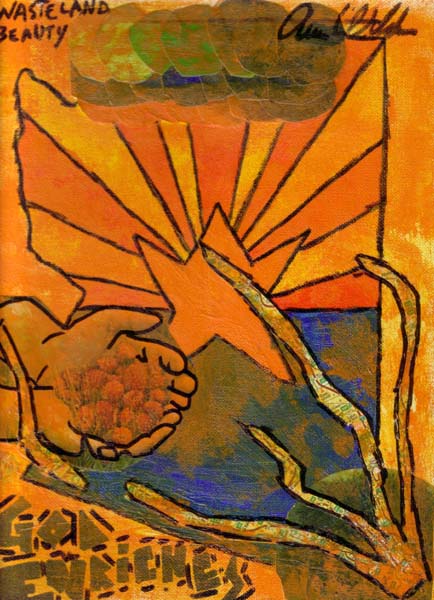
Wasteland Beauty, art by Aaron Wilder
Cul-de-SacMel Waldman
Detective Charles Ross, a rotund middle-aged man, went off duty at 11:30 P.M. He drove to Coney Island to get franks and fries at Nathan’s. He devoured them.
One day, he looked in the mirror and solved the puzzle. He never killed the boy. He murdered Ross.
|
BIOMel Waldman, Ph. D.Dr. Mel Waldman is a licensed New York State psychologist and a candidate in Psychoanalysis at the Center for Modern Psychoanalytic Studies (CMPS). He is also a poet, writer, artist, and singer/songwriter. After 9/11, he wrote 4 songs, including “Our Song,” which addresses the tragedy. His stories have appeared in numerous literary reviews and commercial magazines including HAPPY, SWEET ANNIE PRESS, CHILDREN, CHURCHES AND DADDIES and DOWN IN THE DIRT (SCARS PUBLICATIONS), NEW THOUGHT JOURNAL, THE BROOKLYN LITERARY REVIEW, HARDBOILED, HARDBOILED DETECTIVE, DETECTIVE STORY MAGAZINE, ESPIONAGE, and THE SAINT. He is a past winner of the literary GRADIVA AWARD in Psychoanalysis and was nominated for a PUSHCART PRIZE in literature. Periodically, he has given poetry and prose readings and has appeared on national T.V. and cable T.V. He is a member of Mystery Writers of America, Private Eye Writers of America, American Mensa, Ltd., and the American Psychological Association. He is currently working on a mystery novel inspired by Freud’s case studies. Who Killed the Heartbreak Kid?, a mystery novel, was published by iUniverse in February 2006. It can be purchased at www.iuniverse.com/bookstore/, www.bn.com, at /www.amazon.com, and other online bookstores or through local bookstores. Recently, some of his poems have appeared online in THE JERUSALEM POST. Dark Soul of the Millennium, a collection of plays and poetry, was published by World Audience, Inc. in January 2007. It can be purchased at www.worldaudience.org, www.bn.com, at /www.amazon.com, and other online bookstores or through local bookstores. A 7-volume short story collection was published by World Audience, Inc. in June 2007 and can also be purchased online at the above-mentioned sites. |
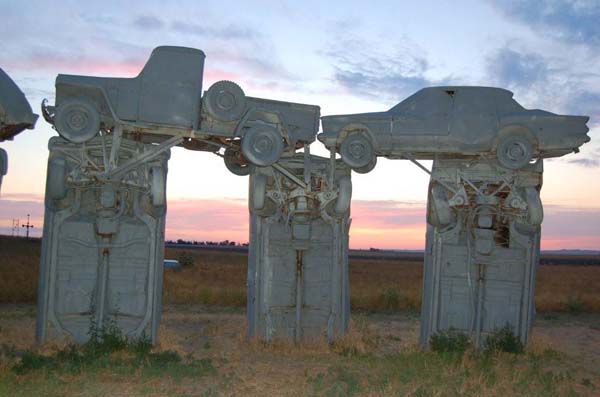
Summer 2007-199, art by David Thompson
Humor for OneStephanie Fleming
I’m going on a blind date. My first one. I am actually terrified but my friends won’t let me back down. I was the last one of our group to try on-line dating. I fought it as long as I could, rebelled against it when everyone else in the world seemed to be doing it.
|
The NeighborhoodBing Liu
There was a beast that lived in the caves of the forest. The forest was behind a little neighborhood subdivision.
|
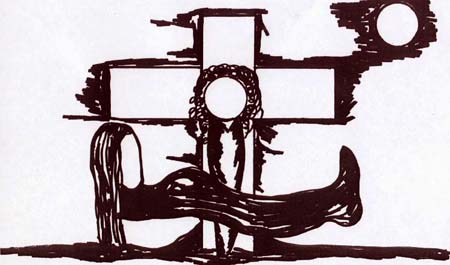
Leviathan, art by Edward Michael O’Durr Supranowicz
Wannabe CowboyJohn Duncklee
Pat Martin, a lifetime resident of New Rochelle, New York, retired from his lucrative insurance business after thirty years. He had realized early on in his career that New Rochelle would provide him with enough wealthy clients for an above average income that would give him opportunities to invest in the securities listed in the biggest gambling hall in the world, the New York Stock Exchange. He was always able to talk those clients into over-insuring their expensive Westchester homes. In his eyes, that was far better than commuting to Manhattan every day just to increase his insurance business. Pat also knew that in Manhattan he would be competing with the slickest of the slick insurance agents in the business.
|
A Reflection of RealityBillie Louise Jones
“It is contemporary journalism that holds the mirror up to life. It used to be the novel that brought the news about the way we live. Not any more. Current fiction holds the mirror up to the writer. It’s masturbatory. Journalism turns outward to the individual in society, the big themes—everything from the national sweep of Presidential elections to true crime to life on mean streets or in suburbia. Its power is that the image is not imagined truth—it’s really real.”
|
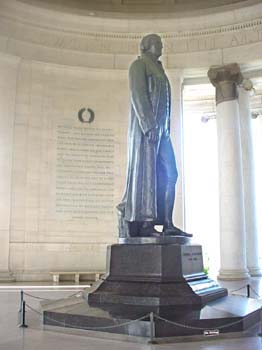
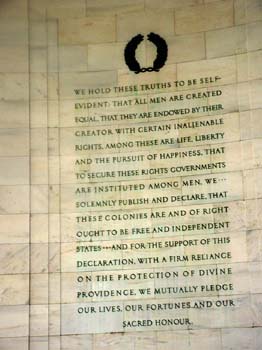
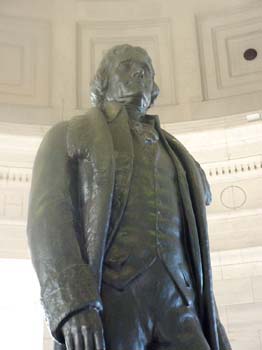
Shock and AweAlicia Parks
“Hey, Cody. I heard your dad got blown up Saturday.”
By the end of third period, however, a new problem had developed. No one was being overtly cruel and most of them seemed to be genuinely not cruel at all – although he couldn’t be sure – but people were pressing in from all sides issuing condolences that just made him feel worse. “I know how you must feel.” “Oh Cody, you must be so sad.” “I know if my dad died I would be...” And worst of all, the repeated thing about being grateful for his father’s service and sacrifice, all delivered with an obnoxiously stiff formality. As if he should feel honored and privileged that it was his dad who got to be blown up. As if, given the choice between father and country, of course he would have chosen his country and was merely somewhat bummed that it had come to that.
Sure enough, by seventh period most people were condoling him in more condolesome – was that a word? – ways and by the next day they’d achieved full compliance. Major relief. Some of them were even hemming and hawing and then apologizing for having been assholes for the last ten years, which he didn’t know how to respond to. Nor did he know what to do with the fact that all the girls kept touching him, including Amy Douglass, who he’d had a really miserable crush on for most of last year. Just little touches, but the cumulative effect was enough to put him in near shut-down, even without the other thing. That was seriously all a guy had to do to get girls to pay attention to him? Maybe he’d write a book, make a million dollars.
|
Backup Man
Roy Haymond |



“Gosamer”, “Gauze”, and “Draped In Gauze”, art by Cheryl Townsend
Why You Should Stop Going to Strip Clubs
S. Paul Bowen |

Kiss, painting by Brian Forrest
Forest LightDon Stockard
Amy swore silently to herself. It would do no good to swear out loud. There was no one to appreciate the occasion, and that was the problem. She was alone, and she was alone because she was lost. She looked at the large fir trees that surrounded her. It was not a dense thicket, and there was little underbrush. It would have been better if there were. She would have been forced to remain on the trail, instead of wandering cross-country.
|
Rule of 3Seger Lansdale
Boy, I can’t wait to hear this! I thought, sitting next to them at the bar, as I had been for most of the night.
|

Debra Purdy Kong, writer, British Columbia, Canada I like the magazine a lot. I like the spacious lay-out and the different coloured pages and the variety of writer’s styles. Too many literary magazines read as if everyone graduated from the same course. We need to collect more voices like these and send them everywhere.
Children, Churches and Daddies. It speaks for itself. Write to Scars Publications to submit poetry, prose and artwork to Children, Churches and Daddies literary magazine, or to inquire about having your own chapbook, and maybe a few reviews like these.
what is veganism? A vegan (VEE-gun) is someone who does not consume any animal products. While vegetarians avoid flesh foods, vegans don’t consume dairy or egg products, as well as animal products in clothing and other sources. why veganism? This cruelty-free lifestyle provides many benefits, to animals, the environment and to ourselves. The meat and dairy industry abuses billions of animals. Animal agriculture takes an enormous toll on the land. Consumtion of animal products has been linked to heart disease, colon and breast cancer, osteoporosis, diabetes and a host of other conditions. so what is vegan action?
We can succeed in shifting agriculture away from factory farming, saving millions, or even billions of chickens, cows, pigs, sheep turkeys and other animals from cruelty. A vegan, cruelty-free lifestyle may be the most important step a person can take towards creatin a more just and compassionate society. Contact us for membership information, t-shirt sales or donations.
vegan action
Children, Churches and Daddies no longer distributes free contributor’s copies of issues. In order to receive issues of Children, Churches and Daddies, contact Janet Kuypers at the cc&d e-mail addres. Free electronic subscriptions are available via email. All you need to do is email ccandd@scars.tv... and ask to be added to the free cc+d electronic subscription mailing list. And you can still see issues every month at the Children, Churches and Daddies website, located at http://scars.tv
MIT Vegetarian Support Group (VSG)
functions: We also have a discussion group for all issues related to vegetarianism, which currently has about 150 members, many of whom are outside the Boston area. The group is focusing more toward outreach and evolving from what it has been in years past. We welcome new members, as well as the opportunity to inform people about the benefits of vegetarianism, to our health, the environment, animal welfare, and a variety of other issues.
Dusty Dog Reviews: These poems document a very complicated internal response to the feminine side of social existence. And as the book proceeds the poems become increasingly psychologically complex and, ultimately, fascinating and genuinely rewarding.
Dusty Dog Reviews: She opens with a poem of her own devising, which has that wintry atmosphere demonstrated in the movie version of Boris Pasternak’s Doctor Zhivago. The atmosphere of wintry white and cold, gloriously murderous cold, stark raging cold, numbing and brutalizing cold, appears almost as a character who announces to his audience, “Wisdom occurs only after a laboriously magnificent disappointment.” Alas, that our Dusty Dog for mat cannot do justice to Ms. Kuypers’ very personal layering of her poem across the page.
Fithian Press, Santa Barbara, CA Indeed, there’s a healthy balance here between wit and dark vision, romance and reality, just as there’s a good balance between words and graphics. The work shows brave self-exploration, and serves as a reminder of mortality and the fragile beauty of friendship.
Mark Blickley, writer You Have to be Published to be Appreciated. Do you want to be heard? Contact Children, Churches and Daddies about book or chapbook publishing. These reviews can be yours. Scars Publications, attention J. Kuypers. We’re only an e-mail away. Write to us.
The Center for Renewable Energy and Sustainable Technology The Solar Energy Research & Education Foundation (SEREF), a non-profit organization based in Washington, D.C., established on Earth Day 1993 the Center for Renewable Energy and Sustainable Technology (CREST) as its central project. CREST’s three principal projects are to provide: * on-site training and education workshops on the sustainable development interconnections of energy, economics and environment; * on-line distance learning/training resources on CREST’s SOLSTICE computer, available from 144 countries through email and the Internet; * on-disc training and educational resources through the use of interactive multimedia applications on CD-ROM computer discs - showcasing current achievements and future opportunities in sustainable energy development. The CREST staff also does “on the road” presentations, demonstrations, and workshops showcasing its activities and available resources. For More Information Please Contact: Deborah Anderson dja@crest.org or (202) 289-0061
Dorrance Publishing Co., Pittsburgh, PA want a review like this? contact scars about getting your own book published.
 The magazine Children Churches and Daddies is Copyright © 1993 through 2011 Scars Publications and Design. The rights of the individual pieces remain with the authors. No material may be reprinted without express permission from the author. 
Okay, nilla wafer. Listen up and listen good. How to save your life. Submit, or I’ll have to kill you.
Dorrance Publishing Co., Pittsburgh, PA: “Hope Chest in the Attic” captures the complexity of human nature and reveals startling yet profound discernments about the travesties that surge through the course of life. This collection of poetry, prose and artwork reflects sensitivity toward feminist issues concerning abuse, sexism and equality. It also probes the emotional torrent that people may experience as a reaction to the delicate topics of death, love and family. “Chain Smoking” depicts the emotional distress that afflicted a friend while he struggled to clarify his sexual ambiguity. Not only does this thought-provoking profile address the plight that homosexuals face in a homophobic society, it also characterizes the essence of friendship. “The room of the rape” is a passionate representation of the suffering rape victims experience. Vivid descriptions, rich symbolism, and candid expressions paint a shocking portrait of victory over the gripping fear that consumes the soul after a painful exploitation.
Dusty Dog Reviews (on Without You): She open with a poem of her own devising, which has that wintry atmosphere demonstrated in the movie version of Boris Pasternak’s Doctor Zhivago. The atmosphere of wintry white and cold, gloriously murderous cold, stark raging cold, numbing and brutalizing cold, appears almost as a character who announces to his audience, “Wisdom occurs only after a laboriously magnificent disappointment.” Alas, that our Dusty Dog for mat cannot do justice to Ms. Kuypers’ very personal layering of her poem across the page.
|